One way people engage with science is through the news and information they encounter in daily life, through conversations, the news media, interactions on social media, or by attending events. The coronavirus outbreak and development of COVID-19 vaccines is a pressing reminder that adults often learn about emerging scientific developments through informal avenues.
To better understand how people engage with news and information about science, the survey asked about four specific areas: news and information about the coronavirus outbreak and vaccines; health and medical issues; energy and environmental issues; and science news and information generally. Each survey respondent was randomly assigned to one of these four topics. (For more, see “When Americans think about science, what do they have in mind?”).
There is a good deal of commonality in how people react to information about these science topics. About half or more Black adults say they find it reassuring to see knowledge in these areas being constantly updated. At the same, similar shares say they have found it difficult to know what to think about these issues because there is so much conflicting information.
Across science topics, majorities of Black adults say that it is frustrating to see so much political disagreement in these areas. For instance, nearly seven-in-ten (68%) say this regarding news and information about the coronavirus outbreak and vaccines.
When it comes to who they rely on for information, experts in these fields top the list for Black adults. However, the survey also highlights the prominent role that friends and family play in sharing information: Majorities of Black adults say they rely on friends and family for information on the coronavirus and vaccines, as well as for health and medicine issues. Roughly half also say they rely a lot or some on friends and family for information about energy and the environment, and for information on science generally.
About half of Black Americans say they’ve talked about the coronavirus outbreak multiple times a week
Underscoring the unique nature of the coronavirus outbreak and its wide-ranging impact on American life, 49% of Black adults said in December 2021, when the survey was fielded, that they discussed news about the coronavirus outbreak and vaccines with other people nearly every day or a few times a week. About a quarter (23%) said they did this a few times a month and 28% said they talked about the pandemic and COVID-19 vaccines with others less often than that.
On social media, a 57% majority of social media users say they have seen information related to the coronavirus outbreak and vaccines on these platforms. A much smaller share of social media users (21%) say they follow an account or page that is focused on information about the coronavirus outbreak.
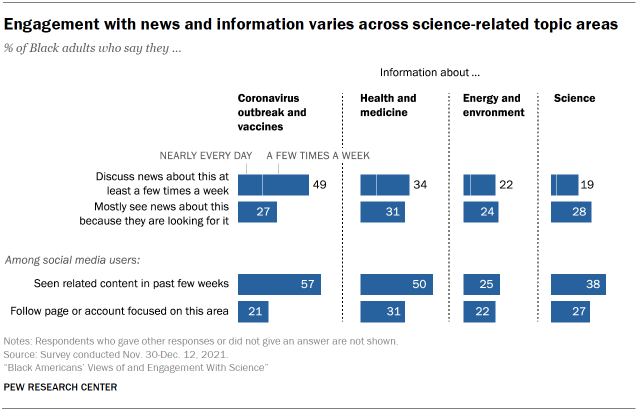
Coming across information – rather than actively seeking it out – is the predominant way Black Americans encounter coronavirus information: 70% say they generally see news about the outbreak because they happen to come across it, while 27% say they are generally seeking out such news.
Compared with the coronavirus outbreak, Black adults are less likely to say they have talked about the other science-related topic areas of health and medicine (34%), energy and environmental issues (22%) and science (19%) multiple times a week.
The overall share of Black adults who say they have talked about science news at least a few times a week is about the same as that reported in a 2017 Center survey, as is the share of social media users who say they follow a page or organization that is focused on science.9
Black adults with higher levels of education are more likely to talk about these topics. A 57% majority of Black college graduates say they talked with others about the coronavirus outbreak and vaccines at least a few times a week, compared with 46% of those who have some college or less education.
Black men and women are about equally likely to say they talk about science news frequently. Among social media users, however, more men (38%) than women (21%) say they follow a page or account that is focused on science.
In the overall U.S. adult population, the share saying they have talked about each of these four topics is roughly similar to that among Black adults. And similar shares of social media users in the general population say they follow an account or page that is focused on the coronavirus outbreak and vaccines, health and medical issues, energy and environmental issues, or science.
Black Americans report mix of positive and negative reactions to science news, express frustration over political disagreements
Black Americans report varied reactions to the science-related news they encounter. Some 57% of Black adults say it is reassuring to see that knowledge about the coronavirus outbreak and COVID-19 vaccines is always being updated, but nearly as many (52%) say it is difficult to know what to think because there is so much conflicting information about the pandemic and vaccines.
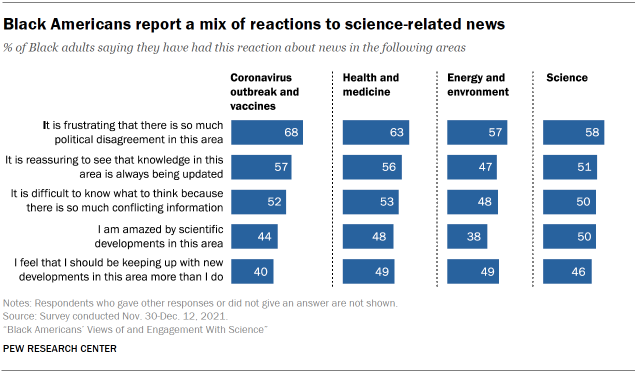
News about health and medical issues, energy and environmental issues and science news, generally, garnered a similar mix of reactions. About half or more Black adults say they have reacted to news on these topics with a feeling of reassurance and similar shares say they have reacted to news in these areas with confusion because of so much conflicting information.
Majorities of Black adults also say they have reacted to news about these topic areas with frustration from so much political disagreement over the coronavirus outbreak and COVID-19 vaccines (68%), health and medical issues (63%), energy and environmental issues (57%), or science news, generally (58%).
Overall, 44% of Black Americans also say they have been amazed by developments related to the coronavirus outbreak and vaccines. About half say this about health and medical news (48%) and 50% say this about science, generally.
The overall U.S. population also expresses a range of sentiments about science-related news. Compared with Black adults, even larger shares of the general population find it frustrating there is so much disagreement about the coronavirus outbreak and vaccines (83%), health and medical issues (76%), energy and environmental issues (74%) and science issues, generally (76%).
Majorities of Black adults say they can rely on experts for science-related information; many also turn to friends and family
When asked who they can rely on for information on science-related topics, Black adults are most likely to say experts, as are U.S. adults overall. Majorities of Black adults say they can rely on information from experts a lot or some about the coronavirus outbreak and vaccines (73%), health and medical issues (68%), energy and environmental issues (63%) and science news (62%).
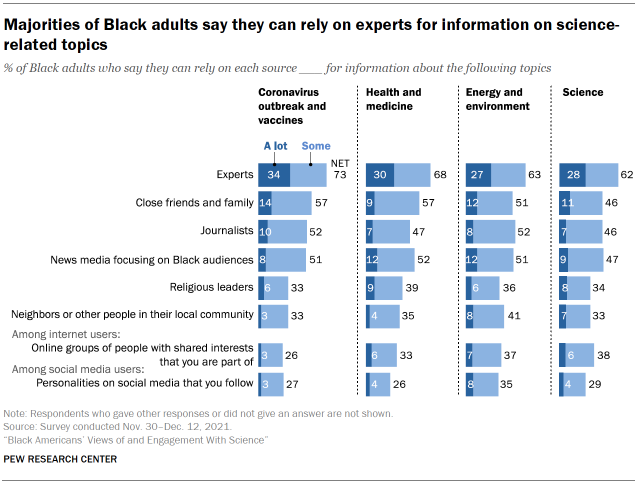
Many Black adults also say they can rely on close friends and family for information on these topics. Slightly more than half say they can rely at least some on close friends and family for information on the coronavirus outbreak and vaccines (57%) and health and medical topics (57%). Slightly smaller shares can rely on friends and family for information on energy and environmental issues (51%) and science news (46%).
About half say they can rely at least some on journalists’ information about the coronavirus (52%), energy and environmental issues (52%), health and medical issues (47%) and science news (46%).
Black adults are about as likely to say they rely on news media that focus on Black audiences for science-related information as they are to rely on journalists generally. For instance, 51% say they can rely a lot or some on news media that focus on Black audiences for information about the coronavirus outbreak and COVID-19 vaccines, compared with about the same share (52%) who say this about journalists.
Fewer than half of Black adults say they can rely on religious leaders for information on science-related topics. Information from neighbors and others in their local community are rated similarly.
About four-in-ten Black adult internet users (38%) say they can rely at least some on people in online groups with shared interests for information about science news. A smaller share of Black social media users (29%) say they can rely on information from personalities they follow on social media for science news information.
Black adults with higher levels of education are more inclined to say they can rely on experts in these areas for information. Some 83% of Black adults with a college degree or more education say they can rely on experts for science news at least some. In comparison, 56% of Black adults with some college or less education say the same about science news information from experts.
There is a similar tendency among the overall U.S. adult population: Those with a college degree or more education are more likely than those with lower levels of education to say they can rely on experts a lot for information in each of these science-related areas.
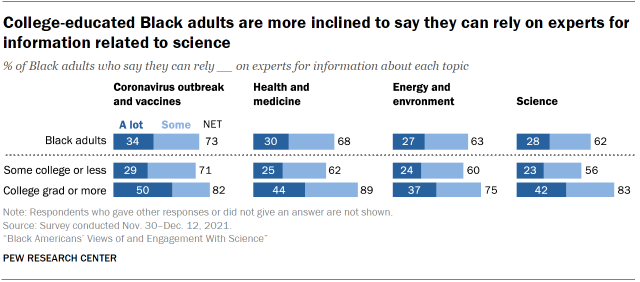
Amid the pandemic, a majority of Black Americans say there were public events related to the COVID-19 outbreak in their community; other science-related events are less common
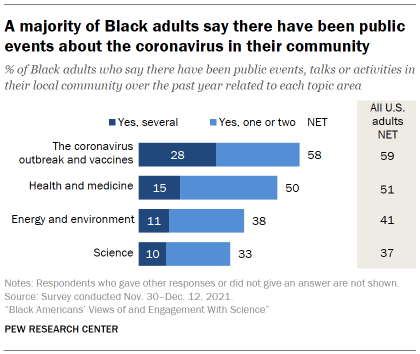
A common theme in focus group participants’ thoughts about how to increase engagement with science centered around the importance of science-related organizations reaching out to Black communities, demonstrating an interest in more science engagement among Black Americans.
One participant responding to a question about how to increase trust in science among Black Americans said,
“You would have to introduce science into those communities, honestly. Make it normal to be in those type of communities. Because I feel like we don’t know as much in our communities about science and the advancements of science because we don’t have the sources really.” – Black woman, age 25-39
Another participant talked about the importance of outreach for Black Americans to be more involved in science, saying:
“Introduce it more. I think they should introduce it more to the community. Show them how important it is … Getting deeper in the schools, getting deeper to parents. Kids need to wash their hands, stuff like that. Science is an important thing. Science is basically everything that we need.” – Black man, age 25-39
The Center survey asked respondents whether they heard or read about science-related events, talks or activities in their local community over the past year. Overall, a 58% majority of Black adults said they had heard about at least one or two events in their area related to the coronavirus outbreak and vaccines. A third of Black adults (33%) said they had heard of at least one or two local events related to science, generally, while 63% had not.
The shares of U.S. adults who say there have been activities in their communities related to the coronavirus outbreak and COVID-19 vaccines, health and medical issues, energy and environmental issues, or general science issues are roughly similar to the shares of Black adults who say the same.
Two-thirds of Black Americans have at least some interest in following science news, though only about a fifth say they are very interested
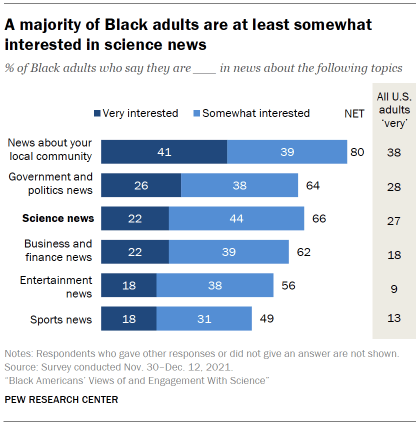
Science news is one among several topics that interest Black Americans: 66% say they are at least somewhat interested in it. This is on par with Black adults’ reported interest in news about government and politics (64%) and business and finance (62%).
Roughly a fifth of Black adults (22%) say they are very interested in science news. This is roughly the same share as found in a 2017 Center survey and modestly lower than that for the U.S. population as a whole.10
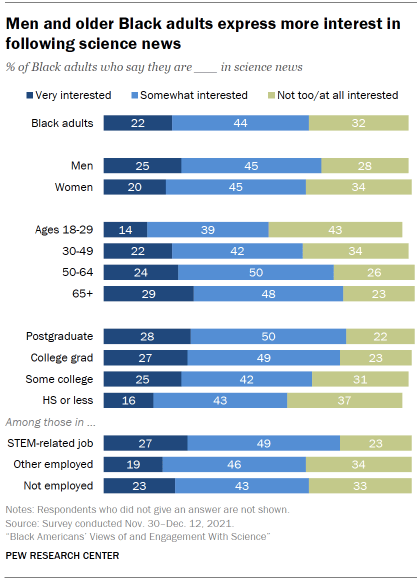
Black men are a bit more likely than women to have an interest in science news; 25% of men and 20% of women say they are very interested. And a slightly larger share of women than men say they are not too or not at all interested in science news.
Black adults ages 18 to 29 are less likely to have an interest in science news. Just 14% of this group are very interested in science news, compared with 29% of Black adults ages 65 and older.
Black people working in a STEM-related job are among the most likely to say they are interested in following science news; 27% of this group are very interested. This compares with 19% of those working in other kinds of jobs and 23% of Black Americans who are not employed.




